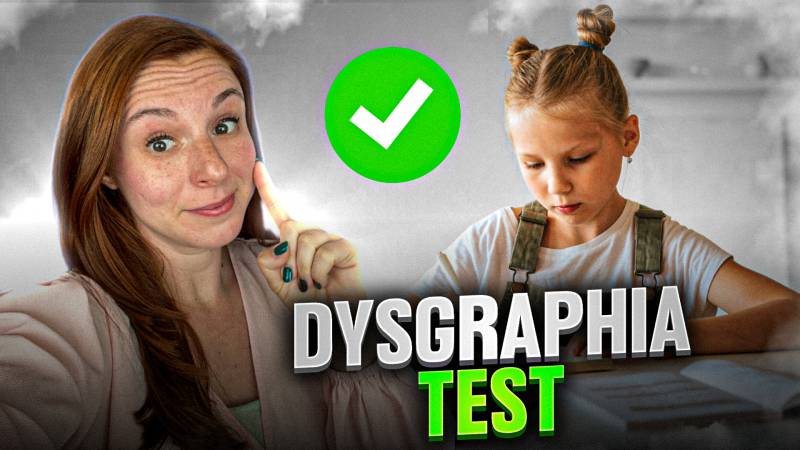
Have you noticed that your child might be having some trouble with writing?
Maybe you’re a little confused as to why their writing skills haven’t improved or have improved very slowly?
Or maybe you’re concerned your child may have dysgraphia? Never heard of dysgraphia before today? Most people haven’t. Even though it’s probably just as common as dyslexia.
Dysgraphia is a difficulty in writing. It expresses itself as a difficulty in getting things down on paper or just sloppy handwriting.
This video will quickly help you discover if your child may have dysgraphia. It’s a quick dysgraphia test you can use to figure out if your child is having trouble in this area.
Let’s get into it. Score yourself as we go. Just add a 1 to your score for each yes answer.
Question #1
Does your child have difficulty holding pencils, pens, or markers, or holds them awkwardly?
Question #2
Does your child have poor handwriting?
Question #3
Does your child leave out letters or words when writing quickly?
Question #4
Does writing cause your child’s hand to hurt or get tired?
Question #5
Does your child have difficulty picking up small objects?
Question #6
Does your child use excuses to get out of writing projects?
Question #7
Does your child have trouble using scissors, buttons, or zippers?
Question #8
Does your child’s movement sometimes seem to lack fluidity?
Question #9
Does your child regularly misspell common words?
Question #10
Does your child avoid writing on whiteboards, blackboards, or flipchart boards?
Question #11
Are there subjects that your child will talk confidently about but resist writing about?
Question #12
Does your child get restless and distracted when writing?
Question #13
When writing does your child vary the letter size?
Question #14
Does your child have a lack of spacing consistency between letters or words?
Question #15
Does your child have difficulty with grammar when writing but not speaking?
Question #16
Does your child’s spoken communication seem more advanced than their written communication?
Question #17
Does your child leave out critical facts or details when writing?
Question #18
Has your child’s handwriting not improved, or improved very little over time?
Question #19
Does your child find it difficult to write within the lines on notebook paper?
Question #20
Does your child have difficulty coloring well in coloring books?
Question #21
Does your child have difficulty formulating sentences when writing?
Question #22
Does your child regularly mix lower case and uppercase letters?
Question #23
Does your child have trouble with punctuation?
Question #24
Does your child have difficulty lining up columns when doing math problems?
Question #25
Does your child have difficulty getting thoughts down on paper?
Question #26
Does your child have difficulty copying text?
Question #27
Does your child avoid drawing, tracing, or painting?
Question #28
Does your child have Difficulty cutting food, doing puzzles, or manipulating small objects with their hands?
Question #29
Does your child have trouble putting their thoughts together when doing writing projects?
Now, what’s your score?
If your score is three or more then this is something to take note of and begin working on developmental exercises to remedy the problem. It doesn’t mean that it’s dysgraphia for sure, but if you get ahead of it your child will be far better off in the end.
Now, I do have some bad news. But also some good news.
The bad news?
Someone with dysgraphia very often will have trouble with other specific learning disabilities such as dyslexia or dyscalculia. The underlying causes are the same, or at least very similar. Different people just express the problem differently because all brains are different.
Ok, ready for the good news?
Handwriting difficulties are corrected faster with therapy than problems in other areas. That makes for faster wins. Faster wins build confidence and the desire to continue to improve. This is called a growth mindset. These wins will also spill over into other problem areas such as reading or math. Eventually, you’ll see wins there as well. You will be leading your child down the path to success in academics. You can do all of that with the Learning Success System.
Do You Need help with a Dysgraphia Difficulty?
Our simple online analysis will help you get to the core of the problem and find the right solution for you.
Understanding how to help someone with a learning difficulty starts with understanding which micro-skills are affected. When you learn which of the micro-skills is the problem, you will then be on your way to solving it.
You'll also learn how to:
- Build confidence
- Enhance Learning ability
- Eliminate avoidance
- Build grit
You can get this analysis for free by filling out this simple form. This will help you get to the bottom of a learning difficulty and provide you with a solution. If you are ready to put this problem behind you click the button below and fill out the form.






